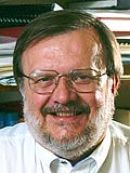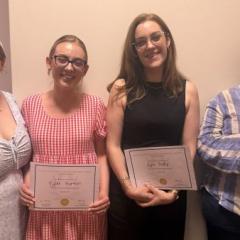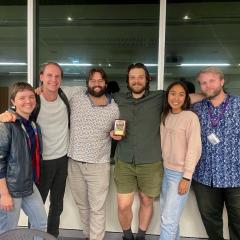
I am very pleased to write a few words in memory of my friend Edgar Conrad. Ours was a friendship that we sustained over the forty years since we first met at a conference of The Australian Association for the Study of Religion in 1977. This was Ed’s first year in Australia having just joined the very new Department of Studies in Religion at UQ. Ed came to UQ with a pretty mint fresh PhD from Princeton Theological Seminary as a specialist in Hebrew and the Hebrew Scriptures (aka the Old Testament). He was promoted to Senior Lecturer in 1984 and to Associate Professor in 1991. He retired from UQ in 2005 but continued his academic activity as an honorary research fellow.
I was fortunate to join Ed at UQ in 1982. The then Head of Department the late Dr Ian Gilman and the new inaugural Professor Frank Andersen were both generous enough to allow Ed and me and two other early career colleagues – Michael Lattke and Richard Hutch – to create the sort of Studies in Religion Department we envisaged as fulfilling the goals of the study of religion in a secular University.
Ed, for his part, was intellectually deeply engaged throughout his career in how to teach Biblical Studies within the secular context. It led to his eventually being in the vanguard of an international movement to move the study of the Biblical text from the historical and philological disciplines in which it had been grounded to an engagement between the Bible and Literary Criticism and Cultural Studies. This led to what is now generally recognised as his ground-breaking book Reading Isaiah (1991) and his commentary on Zechariah (1999). Along with his books went a significant number of articles published in the leading international journals for the Hebrew Scriptures, notably Zeitschrift für die Alttestamentliche Wissenschaft, Journal for the Study of the Old Testament, The Catholic Biblical Quarterly, and Vetus Testamentum. He also served as Vice-President (1985-7) and President (1988-9) of the Australian Association for the Study of Religion.
It is perhaps ironical that, moving away from the historical-critical approach to the literary and cultural, Ed’s work became topical among more conservative Christian scholars – especially in South Korea, the consequence of Ed’s fostering of Korean RHD students in Biblical Studies. So Reading Isaiah has been translated in Korean, as have two series of lectures that Ed gave in Korea. Ed’s ‘Korean connection’ gave him much joy and personal satisfaction.
Ed was a very good scholar and a far better Hebrew specialist than he ever gave himself credit for. And like many of his colleagues teaching ancient languages, he taught Hebrew for the love of it (and not for the workload points). Those were the days when the Department of Studies in Religion taught Hebrew, along with Greek, Sanskrit, Pali and Arabic.
Was research and writing his first love? I don’t think it was. Ed loved undergraduate teaching and was good at it. But it was in the space of RHD supervision that Ed most thrived. His mentorship of RHD students and their success was a great joy to him. In this area, he was a genuine innovator – both of group supervision and of peer mentoring. This was recognised by UQ in 2002 when he received an Award for Excellence in Research Higher Degree Supervision. Over the course of his career, Ed supervised 18 PhD students to completion and over 50 Honours, Masters Research, and Masters coursework students.
Ed also willingly accepted managerial responsibilities. He was Head of the Department of Studies in Religion from 1994-5, chaired the Arts Faculty Postgraduate Studies Committee from 1996-2000, and was Director of Postgraduate Studies in Religion from 1989-2000, as well as making significant contributions to the administration of Theological Education in Queensland more generally.
Above all, he was a major contributor to the success of Studies in Religion at UQ throughout his career. He and I never had a cross word over forty years of friendship – a testimony to the strength of our friendship but more to his patience. He was well known and admired not only within the Department and later the school but also in the Faculty and at the highest levels of University management. He was the sort of collegiate citizen that modern academic staff are encouraged to be. In short, he was a contributor at all levels of academic life, a man whose contribution to academia in general is much to be valued and admired – a ‘team player’. He was in short a good, kind and generous man – not a bad epitaph that!
- Emeritus Professor Philip Almond, University of Queensland



